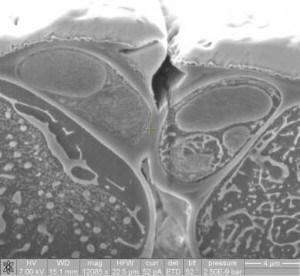Onsite NanoTech Skills Training
We bring the expertise to you
If you don’t wish to travel to learn how to use the instrument you have downstairs, or don’t like having to pay to share training with other organisations – we can visit your site with a nanotech skills training session to personally help you and your colleagues to use your own instrument in your own lab, and to cover only the applications that interest you.
We can create the nanotech skills training that your business needs. Customise your course for each engineer for the best focus, or let all users get an overview of the instrument for the widest deployment.

Decap Training
Some guidelines and hands on training to using acid decapsulation techniques to open your packaged parts.

Using Cryo-DualBeam
NanoScope engineers were the first to successfully use Cryo-DualBeam on biological and other soft materials. We can train you in optimum sample preparation techniques, fracturing, FIB sectioning, coating an imaging of the most senstive samples using this unique combination of techniques.

Gas chemistries, theory and use – 6hrs
Using pre-cursor gas chemistries in your FIB or DualBeam can have variable results. Getting the best depositions or optimising materials etching enhancements requires an understanding of beam-gas interactions. Current density vs gas flux, edge and proximity effects and how to handle beam tails are some of the tricks that help you shorten your time to result.

DualBeam X-sectioning for FA, PA and 3D studies – 1 day
Using a DualBeam for X-sectioning can provide some advantages, but getting the best from a DualBeam requires additional knowledge. In-situ decoration of x-sections for SEM imaging, multi-slice sectioning (manual or automated) for 3D Studies and getting the best image, all need to be learned.

Micro(Nano) machining practices – 4hrs
Prototype the structures you need by using FIB as a direct write lithography tool. Learn about beam optimisation, current vs time, deposition and etching vs milling, and how to import milling files directly.

Making TEM foils basic – 6hrs
Not everyone has an automated TEM foil program. Even those that have one, find it often doesn’t work or fails when run on materials with structured surfaces. Manually milling a TEM foil from different materials can be challenging and requires user skill. Learn what to look for in a good foil and how to get there in the shortest time.
Advanced circuit edit – 1 day
Modifying advanced devices requires a strategic approach. Design your fix before you implement it for best results. Use your gas chemistries for best effect and get it right first time.

FIB Basics – 1 day
Basic principles of using a Focused Ion Beam Instrument. Beam behaviour, tricks and tips, things to avoid, getting a good beam and how to use it best. Start with this and then add advanced sections to give your engineers the skill set they need now and add to it later if needed.
